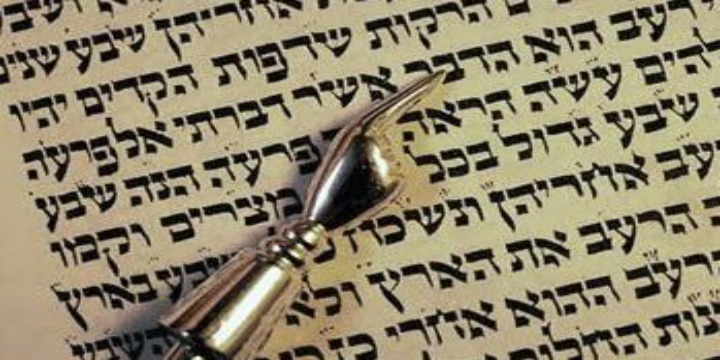
A Torah scroll. Photo: Wikimedia Commons.
Any Anglo Jew from the 1960s will be familiar with the “Jacobs Affair” that divided the Jewish community more than any other religious debate in its history. There were other conflicts: between Sephardi and Ashkenazi, Reform and Traditional. But none as bitter or as lasting as this. I was a teenager when it all began, but it had a profound effect on how I viewed the Jewish religious establishment.
Rabbi Louis (Laibel) Jacobs (1920-2006) studied in Yeshivot in Manchester and Gateshead and embarked on a career in the English rabbinate. He moved from the Central Synagogue in Manchester to the prestigious New West End Synagogue in Bayswater, London. It was part of the powerful Anglo Jewish establishment, the United Synagogue, that was under the authority of the Chief Rabbi and his Court, the Beth Din.
Jacobs was one of the most impressive scholars and thinkers of his time. In an early book We Have Reason to Believe in 1957, he pointed out that there were different ways of understanding the concept of Divine Revelation, Torah Min Hashamayim. His sources were traditional, nothing he said was really controversial, and the book had been positively reviewed even by religious journals. Most United Synagogue rabbis at the time saw no problem with what he wrote.
He resigned from The New West End in 1960 to become a tutor and lecturer in Jews College, the rabbinical training academy of Britain. He was expecting to succeed Rabbi Dr. Isadore Epstein, the principal, who was about to retire. He was so highly regarded by students and colleagues that I was encouraged by my father to attend his lectures after I had graduated from school. He was a masterful and inspiring teacher with an intellectually open attitude towards modern scholarship.
Related coverage

January 31, 2021 3:45 am
We Have Reason to Believe fell into the hands of Dayan Grunfeld of the London Beth Din, who came from a rather staid Germanic background. He decided that Jacobs’s views were too heterodox for the principle of Jews College and campaigned accordingly. When the time came to make an appointment, Jacobs was blocked by Chief Rabbi Israel Brodie at the urging of the Beth Din and the newly enthroned lay leader of the United Synagogue, Sir Isaac Wolfson. Jacobs resigned.
The editor of the Jewish Chronicle, William Frankel, took up the cudgels and turned the issue into one of the character of Anglo Jewry. Frankel felt that given the reality that most United members were not really practicing Orthodoxy but were loyal to tradition, the United Synagogue could best serve them by being tolerant and non-judgmental. Louis Jacobs agreed. Even if he did not subscribe to Frankel’s personal agenda to get the organization to join the Conservative Synagogues in the USA. Unfortunately, the conflict turned into a conflict of rival visions.
Having resigned from Jews College, Jacobs was invited to return to head his old synagogue, the New West End. But now, egged on by the Dayanim, Brodie refused to authorize his appointment there too, despite not having objected previously when he was the rabbi. Louis was caught in a crisis not of his own making. He was a modest and sensitive man. But the way he was treated brought out an unexpected combative side to him and he defended himself with vigor.
Before the crisis came to head in 1962, as my father was dying at the young age of 48, Louis came to visit him at Carmel College and I was present for the nearly two hours that they spoke. My father begged Louis not to allow Frankel to make an issue of the situation. He felt that Frankel was motivated by a personal grudge because of the way his father had been treated by the United Synagogue. He told him that Frankel did not have Louis’ best interests at heart and was using him to forward his own desire to undercut the US by establishing the Conservative movement in the UK. The project would not prosper simply because of the deeply entrenched, financially powerful United Synagogue itself, as well as the Anglo reluctance to challenge authority and tradition. Unfortunately, Louis was so pained by his treatment that he reacted more aggressively than was wise or indeed in his nature.
After he was blocked from returning to his old pulpit, in 1963 supporters of Jacobs resigned from the New West End and set up an independent synagogue with him as its rabbi. It continued the very same traditions and rules the New West End synagogue followed, including a mixed choir that all but one other otherwise Orthodox synagogue had abandoned. Some rabbis and a few communities wanted to join him. But the power of conformity won out. The community was split between those who supported him and those who ostracized him. Jacobs continued to defend his position both halachically and intellectually. The United Synagogue retaliated by refusing to recognize his marriages and conversions.
I recall how strongly the younger generation felt about his treatment. The Inter-University Jewish Federation (IUJF) appointed him their honorary president. At the IUJF student conference in Leeds in 1963, he was given a standing ovation and I invited him to speak at our annual educational seminar. Beyond Britain, his brilliance won him respect, invitations, and awards, both in secular academic circles and Jewish ones, including a lectureship at Harvard. Whenever he was challenged as to whether he considered himself a Conservative he categorically denied any affinity. He remained strictly Orthodox till his dying day. It was others who established what became the Masorti movement in the UK.
Chief Rabbi Israel Jakobovits (himself more orthodox than Brodie), even if he disagreed with some of Jacobs’s arguments, tried to heal the breach. He maintained good and respectful relations with Jacobs personally, supported him privately, and persuaded his Beth Din to recognize his marriages. His successor failed to follow up. Perhaps he was too insecure in his position and on several occasions when he wrote to refute Jacobs he did so aggressively as if to curry favor with the right-wing.
Some 25 years after the “affair,” I wrote an article in LeEyla, the house journal of Jews College. In it, I praised Louis Jacobs as a giant of Jewish religious and rabbinical thought, and repeated my father’s reservation about his trying to take on the establishment of Anglo Jewry. I ended by saying that the ostracism of Louis Jacobs was a tragedy both for him and for Anglo-Jewish Orthodoxy. And that the affair was a watershed in the right-wing shift and intolerance of the community. I heard from Rabbi Abner Weiss, the then-head of Jews College, that the Chief Rabbi had told the editor not to accept any more articles from me for praising Rabbi Jacobs and thereby, by implication, attacking the Dayanim and the Chief Rabbi.
In 1995, having retired from the rabbinate, I was asked by the Board of the New London Synagogue to consider succeeding Louis at his synagogue. I was not interested in returning to the rabbinate, but out of respect and a desire to see him again, I welcomed the opportunity of a meeting with him. Beforehand, I asked the leading Dayan of the Beth Din whether, if I could persuade the synagogue to rejoin the United Synagogue, he would agree and facilitate rectifying any outstanding status issues. He said he would. On that basis, I went to see Louis.
Our meeting was a delight and we agreed on almost all issues except for one. He was passionately committed to his Minhag Anglia, the synagogue customs of the English variation of traditional orthodoxy. I had been brought up by my father to enjoy the more informal, musical, and Israel-orientation of services at Carmel College and subsequently the Haredi passion of services in Yeshivahs and Hassidic dynasties in Jerusalem. I found the United Synagogue and Louis’s Minhag far too staid and uninspiring. But as I talked about my views, I could see him react negatively. I realized that the most rebellious and creative of the rabbis I had met was far too traditional to change.
The one example of genuine support in the Orthodox world for Louis Jacobs was the respect that Chabad/Lubavitch had for him. He was called as an expert witness in a case in New York about the ownership of the previous Rebbe’s library. Some books were removed and sold by a grandson claiming they were his, as an heir. Lubavitch argued they belonged to the movement. Jacob’s many books about Hasidism enabled him to testify about the nature of property in a Hasidic dynasty, which swayed the judge to decide in favor of the movement
The newly published biography We Have Reason to Believe: The Controversial Life of Rabbi Louis Jacobs by Harry Freedman records his life, his writing, and many achievements. It describes a genuinely good, modest, caring, religious human being. He bore the slights he suffered with dignity to his dying day. He was even refused an Aliya in a supposedly Orthodox synagogue by the Court of the Chief Rabbi at his grandson’s Bar Mitzvah.
The dispute has remained a sore point in Anglo Jewry to this day. It illustrates how the self-protective, inward-looking attitudes of Orthodoxy and its leadership can sometimes do more harm than good. And it reminds me why I have always been so anti-establishment and how religious authority can be abused at a great cost to its own health.
Rabbi Jeremy Rosen has worked in the rabbinate, Jewish education, and academia for more than 40 years in Europe and the US. He currently lives in America, where he writes, teaches, lectures, and serves as rabbi of a small community in New York.
Related posts:
Views: 0
 RSS Feed
RSS Feed

















 January 31st, 2021
January 31st, 2021  Awake Goy
Awake Goy  Posted in
Posted in  Tags:
Tags: 
















